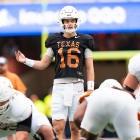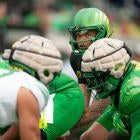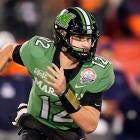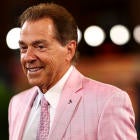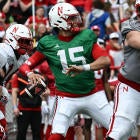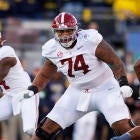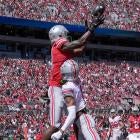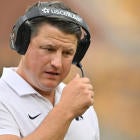More college football: Jon Solomon | Dennis Dodd | Jeremy Fowler | Latest news
DESTIN, Fla. — The SEC is considering ending its graduate-student transfer ban. Three proposals from South Carolina are being discussed at the SEC spring meetings to put the SEC more in line with the NCAA rule that lets graduate students with eligibility remaining transfer to another school.
The NCAA adopted the rule in 2006 to allow graduates to transfer for their final year of eligibility as long as their new school has a graduate program the old school doesn’t offer. The rule was seen as a carrot to athletes who graduate with eligibility left, but it has also been criticized as free agency in college sports.
The SEC applied the NCAA rule until 2011, when it opted out for one major reason: Jeremiah Masoli.
Masoli had graduated as an Oregon quarterback but got kicked off the Ducks team for disciplinary reasons. Ole Miss enrolled Masoli in a Parks and Recreation graduate program not offered at Oregon.
The NCAA initially denied Masoli’s waiver to play immediately, but Ole Miss won its appeal and Masoli played in 2010. The rule also allowed former Utah cornerback Ryan Smith to play immediately at Florida in 2006.
After the Masoli affair, SEC Commissioner Mike Slive said he wished every other conference would use the SEC’s current policy, which requires athletes to have at least two years of eligibility left to transfer into the league. The SEC does provide some waivers to graduate transfers on an individual basis.
Now South Carolina is proposing the SEC go the route of the NCAA, in large part due to competitive concerns. Graduate transfers have increasingly become a popular way for basketball coaches to replenish their rosters.
“This was more of a basketball issue than anything else,” South Carolina athletic director Ray Tanner said. “There have been a couple instances where we’ve been recruited against in our league with basketball possibilities because the player is immediately accepted into other institutions but not in the SEC because of the process. So it does put us at a little bit of a recruiting disadvantage.”
Ole Miss basketball coach Andy Kennedy signed two fifth-year players this season and is going through the process now of getting SEC waivers. Among the criteria for those players to participate immediately in the SEC: They must be in good academic standing, have had no academic or disciplinary trouble at their previous school, and never lost any APR points.
“But when you go through the waiver process, sometimes that’s a competitive disadvantage in the recruiting process because maybe somebody outside tells a player, ‘We know we can take you, and you don’t have to wait,’” Kennedy said.
SEC football coaches are also discussing the proposal.
“I don’t think we’ve come to a conclusion,” Texas A&M coach Kevin Sumlin said. “It’s affected me the other way — I’ve had two quarterbacks leave in two years and become eligible at other places.”
The South Carolina proposal justifies changing the SEC rule because of competitiveness factors and that the current rule “is contrary to student-athlete welfare and penalizes student-athletes who are successful in the classroom, but continue to have a desire to compete during their graduate studies. Graduate student-athletes should be afforded the same opportunity to receive a graduate education and compete at the highest level in the same manner allowed under NCAA rules.”
South Carolina proposed three options:
* Allow all graduate-student transfers to play immediately in the SEC.
* Let all graduate-student transfers play immediately in the SEC except in football. “The sport of football is excluded from this proposal in order to alleviate concerns related to lack of academic accountability for graduate students who might enroll for the fall term only and subsequently professionalize themselves,” the proposal says.
* Open up graduate-student transfers in the SEC only in basketball. “Since the basketball competitive season stretches into the spring semester, student-athletes remain academically accountable in order to remain eligible to compete,” the proposal states. “Basketball graduate students also remain accountable for the 'E' points in APR (eligibility), and institutions consequently have an interest in ensuring these student-athletes continue to succeed academically.”
The reaction among SEC ADs is “pretty mixed,” Tanner said. “I suppose we’ll vote on it by the end of the week. We’re just discussing it now.”












